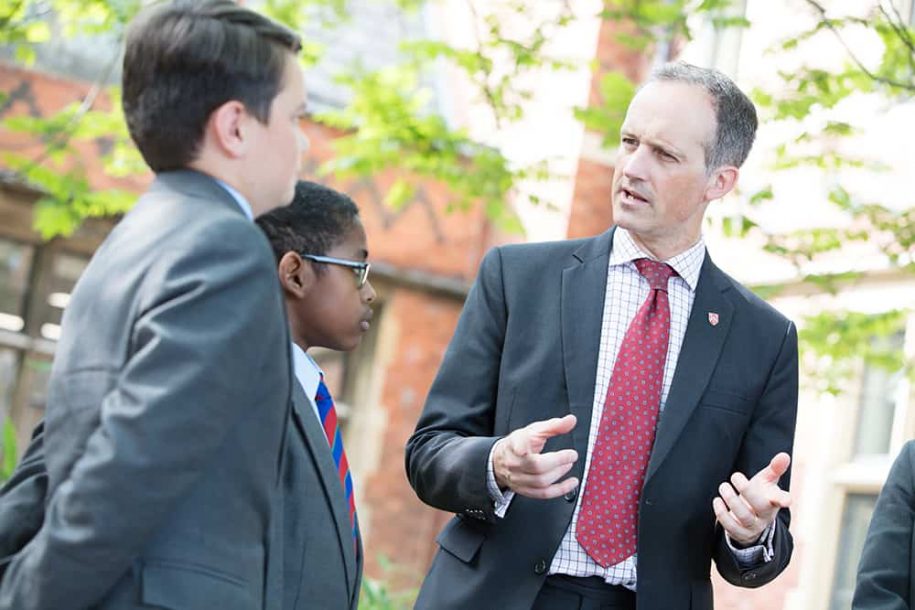The anonymity of excellence

One of the great joys of being Headmaster at Loughborough Grammar School is that I am able to appreciate the boys’ commitment to a huge variety of activities in the course of regular school life. Mass participation events are incredibly impressive and testament to our sense of community. I think of the Year 7 Pantomime where every single boy has his own lines, or the Remembrance Day parade, with well over 200 cadets on display.
At this point in Spring Term, I am very much looking forward to the De Montfort Hall concert on Saturday 4<sup>th</sup> March, where not only our top musicians but also the entire Year 7 will be on stage. I think it’s wonderful that every boy in the school during Year 7 both sings and acts in a major school event; even if it’s the only time for him, he will have had a valuable experience that he will remember for many years. At the De Montfort Hall concert, we contrast the mass participation of Rutter’s Magnificat with approximately 400 singers and instrumentalists on stage, with elite musical performance from the LES Orchestra and soloists. I sure that you can appreciate why we do this – we want the youngest boys in the school to be aware of the sheer excellence of some of the older boys so that they can aspire to match them as they progress through the Grammar School.
However, the mixture of mass participation and excellence is a relatively rare occurrence. I was reflecting recently that much of the excellence of boys’ achievements can be overlooked by the community as a whole. Part of my job is to support as many school events and activities as I can, so personally I would like to think that I have a good understanding of the range of excellence displayed by LGS boys. However, the boys have their personal interests and inevitably find their efforts concentrated in a small number of areas.
This is why, twice a week in school assembly, I read out boys’ achievements, whether academic, sporting or in other co-curricular fields. The boys are tremendously respectful of each other’s talents and interests, but the brief recognition of others’ excellence through the boys’ applause doesn’t really do justice to the astonishing commitment that has led to each accolade. This is why I’ve referred in my title to the ‘anonymity’ of excellence. It’s very difficult for us to appreciate what contributes to excellence in a particular field without spending time to understand how it has been developed over weeks, months and years. The prizewinner is entirely ‘anonymous’ during the training, repetition and practice that has underpinned his success.
I will cite two major achievements from just before half-term in early February. Firstly, our senior Cross-Country team won the King Henry VIII School relays in Coventry, defeating 80 other schools. We have attended the event yearly for 46 years, and this was our first victory. Without giving anything away, Mr Miles has striven for this success with generations of LGS boys. We also managed the largest margin of victory in the history of the event. When we spend a moment considering what contributed to this success, we can imagine quite clearly the hours of training, often in the cold and rain of winter, and those of us with some running experience may also conjure up the image of burning lungs during speed training sessions. The boys’ excellence only becomes ‘real’ when we make the effort to consider how it has come about!
Similarly, over 250 pupils from the Grammar and High Schools participated in the Solo Music festival over the course of an entire week, culminating in an extraordinary final where 17 students competed for the title of ‘Young Musician of the Year’. Although our musicians support one another extremely well by attending one another’s concerts (and there are around 100 per year in our Music School), the majority of boys in the LGS community experience music of the highest quality only irregularly, for instance when he has a performance. I fear that it’s tempting for boys to think that the obvious excellence that they hear on these rare occasions is down to talent alone – as they might do when contemplating the achievements of our runners or mathematics Olympians. We need to make a conscious effort to imagine the discipline of hours of daily practice. (The 30 minutes per day that I told my parents I used to practise aren’t remotely sufficient to achieve the standards our best musicians display!)
It’s all too easy to take excellence in a specific area for granted if we don’t think about what has created it. If we make the effort to do this, the conclusion is actually quite simple; no success is achieved without consistent hard graft. We must try to explode the talent ‘myth’ – the fallacy that some boys are genetically programmed to excel – and explore how these high achievers have constructed their success on discipline and determination.
I made a similar, if briefer point to the boys at an assembly a couple of weeks ago, and challenged them to attend school events that would not normally form part of their regular diet, in order to better appreciate the excellence around them. Please do encourage them to do so as they may well discover an interest that has hitherto lain dormant! Many of those reading this blog will relate to this. Many adults love music despite having never learned an instrument themselves. I love art, despite having wasted my art tuition as a youngster, convinced that I had no talent and so therefore shouldn’t try. Please encourage your son to find the opportunity to support one of his friends who has a different interest. It may open new and interesting horizons for him, but it’s also what a good friend <u>should</u> do!
